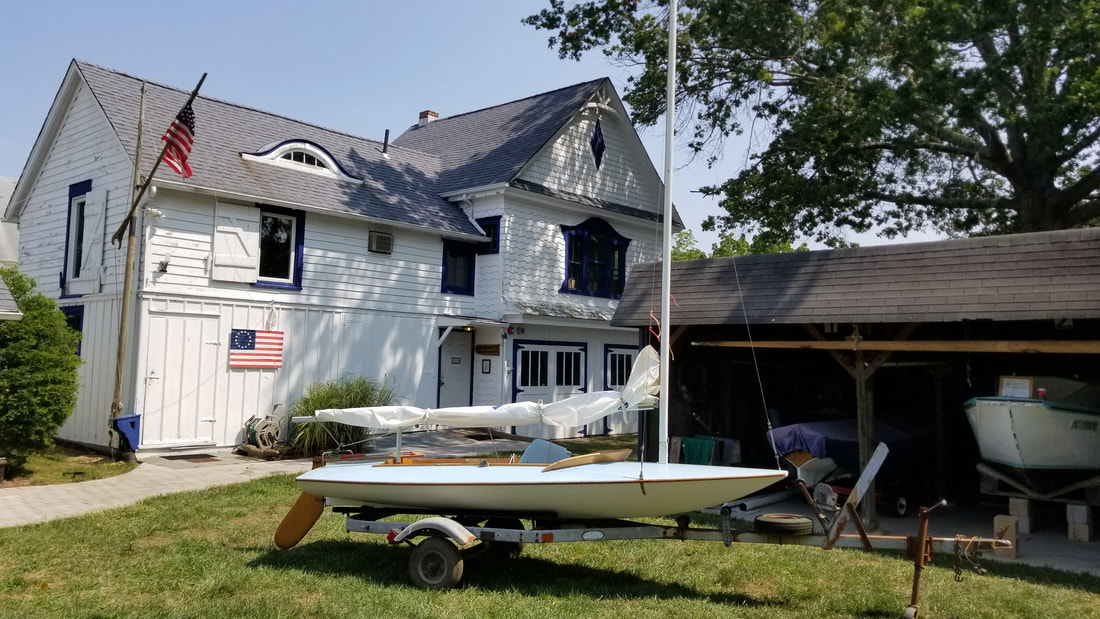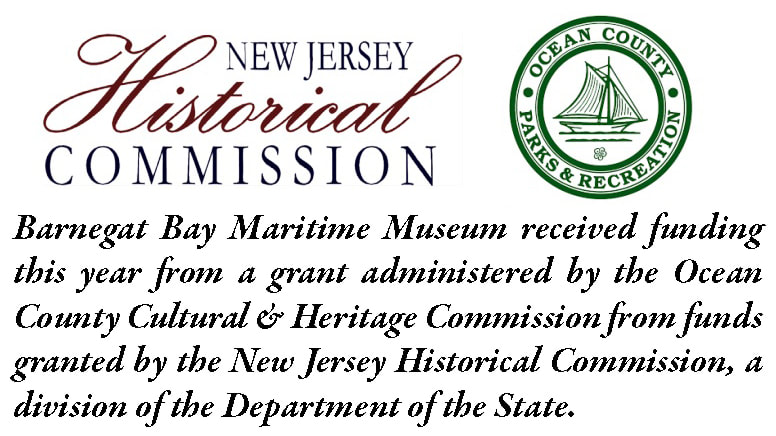|
Welcome to another Wooden Boat Wednesday!
This Wednesday continues the sketch of life about Barnegat Bay in the 1890s, courtesy Kobbe's The New Jersey Coast and Pines, an Illustrated Guide-book with Road-maps.
THE PIRATES OF BARNEGAT. – Many of the beaches south of Bay Head retain their original wild and desolate character. One can wander for miles among the dunes without coming upon human habitation other than the Life-Saving stations or an occasional gunner's hut. These beaches were settled by whalers as early as 1640, whales being then plentiful off shore. Afterwards, and until the establishment of the Life-Saving Service, it was on these beaches that the "Barnegat Pirates" plied their infamy. These miscreants had not the venturesome spirit to cruise the sea and attack every vessel they met, sometimes even accepting the risk of a fair battle. Their piratical acts were the more dastardly because they rarely involved peril to the lives of those who perpetrated them. A man who coldly shoots down his fellow-man from ambush is not more cowardly than were these Barnegat Pirates. Woe to the ship and crew which in those times found themselves off one of the Jersey beaches of a stormy night! The elements were not half as pitiless as the wretch who trimmed the false beacon on the beach, while the band of wreckers stood among the dunes peering with straining eyes through the gale and sleet in eager expectation that some vessel would be lured out of her course and driven on to the shoals. It is easy to imagine the scene which was then enacted. Suddenly a ghostly, heaving form is discerned through the storm. A ship is plunging toward the breakers. There is a crash, a wail of despair, heard above the uproar of the tempest, and the false light has fulfilled its mission. The wreckers are now watching the surf. Suddenly a dark object is tossed up from the hollow of a wave and rolled ashore through the surf—the corpse of the first poor fellow to drop benumbed from the ice-coated rigging. The wreckers regard him with indifference - he is only a sailor with no money about him. Another is cast ashore and then another; and then they come rolling in faster. Some object larger than a man's body darkens the surf. It is a door from which one of the panels has been knocked out. A man has thrust an arm through the frame and hangs on to it, while with the other he clasps a woman so tightly that even the fury of the elements has not availed to separate them. The wreckers pay more attention to these corpses. They search the captain's clothing till they find a wallet and then take his wife's ear-rings. The number of corpses washed ashore has confirmed what the crash with which the vessel went on the shoal told the wreckers—she is a large ship, a prime prize for the Barnegat Pirates in spars, timber and cargo. And the chances are she will break up before daylight, so that they can secure a good share of the plunder under cover of the night. Such were some of the scenes once enacted on that desolate shore when the Pirates of Barnegat were in league with the demon of the tempest. When one reflects upon the terror of a storm at sea; the joy with which the tempest tossed mariner must have beheld what seemed to him a familiar beacon; and the despair that must have come over him when he saw the line of hissing breakers ahead, and realized that he had been lured to certain death, one fails to find words strong enough to express one's sense of the villainy of the Pirates of Barnegat.
The natives of the coast are rather chary of information regarding these matters—they are too nearly contemporaneous to be freely spoken of. But sometimes, while sitting of a winter evening around the open fire-place of one or another of the old-fashioned inns on the coast, one can gather no uncertain details of these crimes, and old sportsmen will tell of taverns among the dunes where wines of the finest vintages of France and Germany could be had for a mere song. There is also a dark tradition that of wild winter nights a white female figure can be seen wandering up and down Long Beach and suddenly falling upon her knees and bending over with clasped hands, as it over a corpse. This is said to be the specter of a young woman who was an active member of a band of wreckers of which her father was the leader. One night, when the corpses were beginning to roll in from a vessel which this band had lured on to the shoals, the men heard their leader's daughter give a shriek and saw her throw herself over one of the bodies. It was the corpse of her sailor lover, who, it was afterwards learned ,had escaped from a wreck on the British coast and had then shipped for home in the very vessel she had helped lure to destruction. Nowadays, the only men to be found on the beaches of a stormy winter night are the life-savers. The service has put an end to wrecking as a business. For a living the natives now “follow the bay" or provide entertainment for summer visitors and the sportsmen who are at all seasons attracted to this coast. Of a winter night, instead of hoisting false signals on a storm-swept beach, they draw up to the open fire place or sit around the tap-room stove of their village inn, and their signaling is confined to "tipping the wink” to one another when to begin “loading up” some fresh, green youngster, down from the city on his first duck-shooting expedition, with stories of the wonderful sport to be had on the Bay—stories in which the 52 broad-bills bagged in a day by one gunner at Wrangle Creek, or the 73 bagged in Sedge Islands thoroughfare, or the single haul of 200,000 pounds of fish in Metedeconk River in 1847, usually figure in the expressive native vernacular. Another story is perhaps cut short by a gust of wind caused by the opening of the door. Three muffled figures seem to be fairly blown in. When they have thrown off their great-coats the new-comers turn out to be an ex-sheriff from Tom's River, with a spare, shrewd, gray-whiskered face, and two friends who have come down to have a quiet little game with the landlord. They join the circle around the stove, and the ex-sheriff reminiscences for the benefit of the young sportsman of the days when he could beat every man in Ocean and adjoining counties at quoits. Then he invites all hands up to the bar. “Drink hearty, gentlemen! Drink hearty!” he says briskly, and tosses off three fingers of rye, after which he and his friends retire with the landlord. The next morning, at breakfast, the landlord and the ex-sheriff's two friends can hardly hold up their heads; he has long ago hitched up and is well on the road to Tom's River. It may be judged from this brief sketch that life along Barnegat Bay is quite different from that at the resorts north of Bay Head. There the visitors do not mingle with the natives. But along Barnegat Bay one is brought into quite different relations with them. You feel like knowing more of the man who brings down his red-head every time, who knows every fishing-ground, and who can steer his yacht unerringly through all the channels, thoroughfares and “slews," and an entente cordiale, such as exists between the Adirondack hunter and his guide, is soon established between the sportsman on Barnegat Bay and his boatman or gunner. Enjoyed this article? Please consider making a one-time or recurring donation today!
Your donations support preserving and restoring our shared maritime heritage on the waters of Toms River and Barnegat Bay, through our boat workshop, educational programs and special events. Thank you.
Open Tuesdays, Thursdays, Saturdays - 10 am to 2 pm
78 East Water Street, Toms River, NJ 08753 Guided Tours By Request - New Members Always Welcome (732) 349-9209 - [email protected] Comments are closed.
|
NEWSArchives
May 2024
Categories |
OPEN TUES/THURS/SAT 10 to 2
Barnegat Bay Maritime MuseumVertical Divider
|
Upcoming EventsVertical Divider
|
|
© Barnegat Bay Maritime Museum. All rights reserved.




 RSS Feed
RSS Feed
